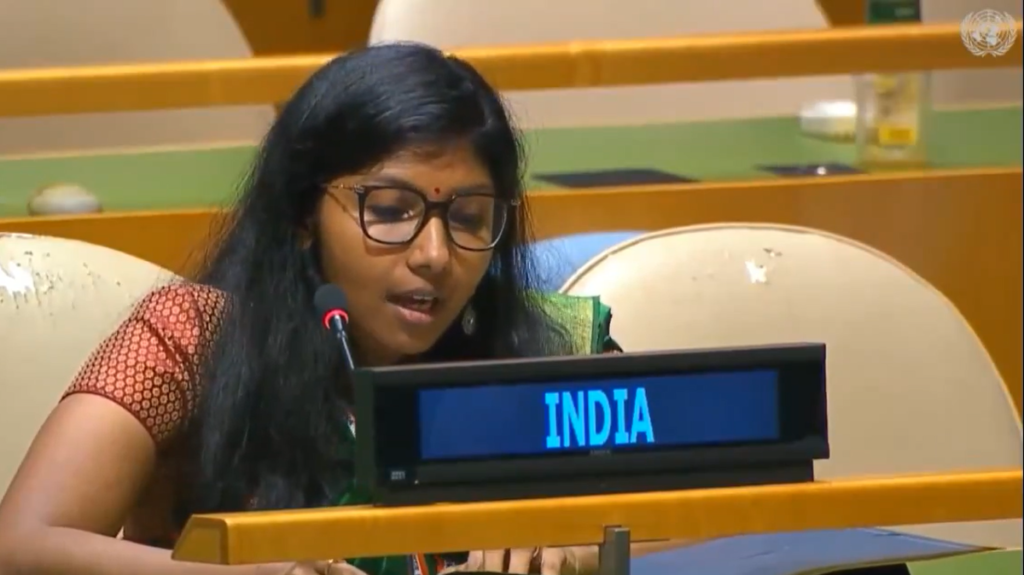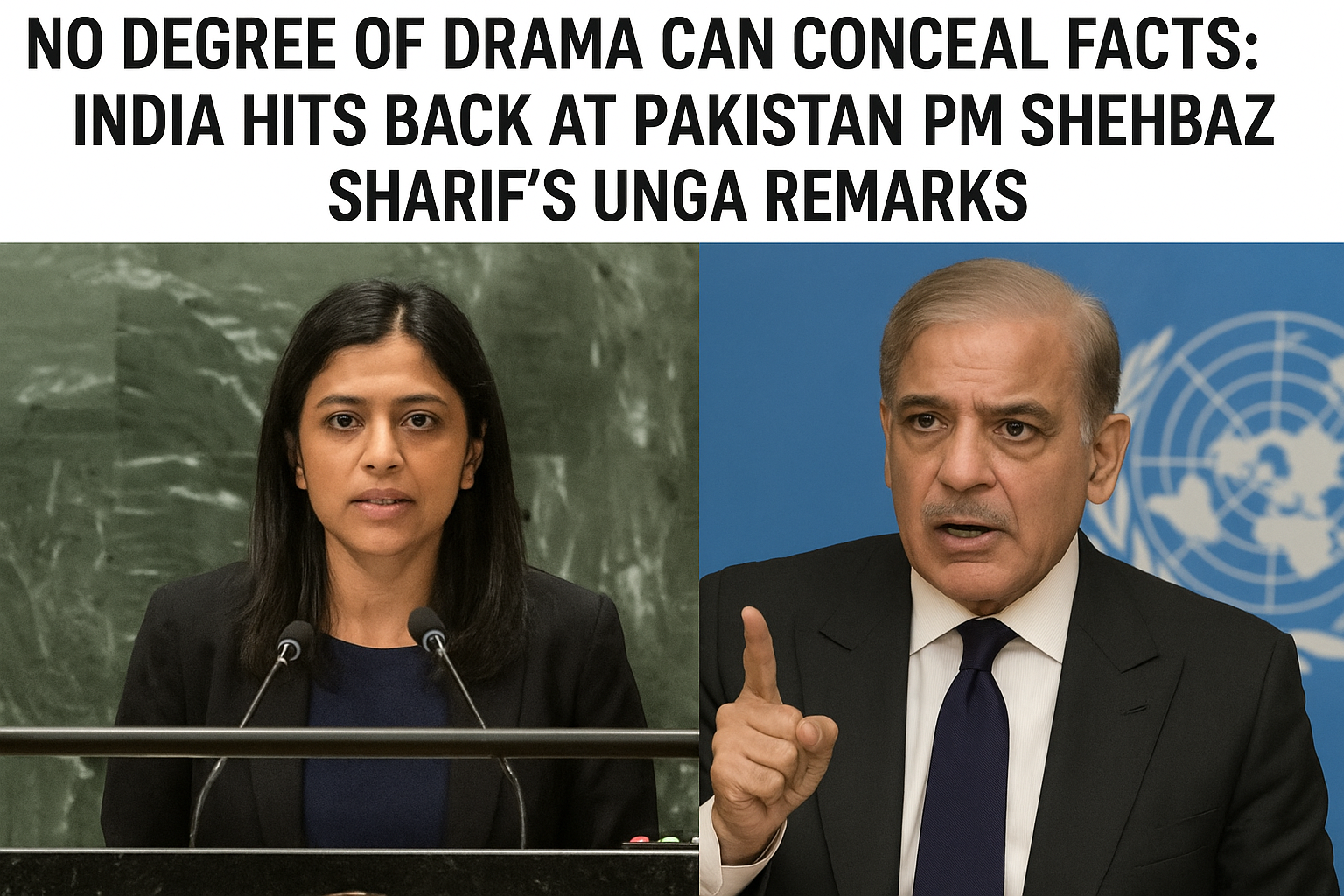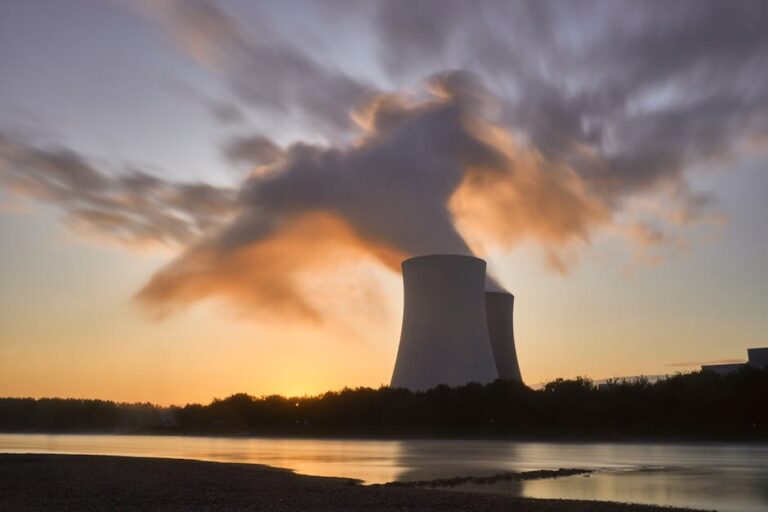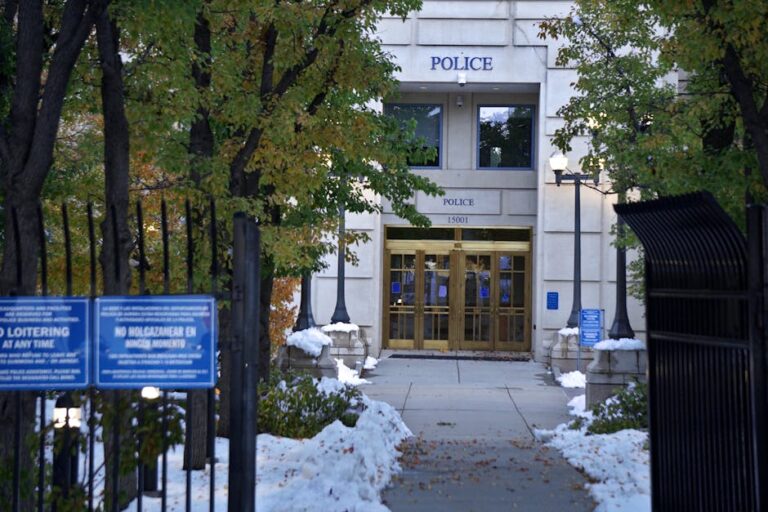India has delivered a sharp rebuttal to Pakistan Prime Minister Shehbaz Sharif’s remarks at the United Nations General Assembly ( UNGA ), describing them as “absurd theatrics” designed to divert global attention from Islamabad’s own record of supporting terrorism. Exercising its Right of Reply on the floor of the UN, New Delhi stressed that “no degree of drama and no level of lies can conceal the facts,” highlighting Pakistan’s longstanding role in nurturing and glorifying terrorism.
The strong response came from Petal Gahlot, First Secretary in India’s Permanent Mission to the UN, shortly after Sharif’s speech. Pakistan had used the global platform to comment on India, raise the Kashmir issue, and even invoke the controversial narrative of “Operation Sindoor,” claiming it was a strategic victory against India.
India Slams Pakistan’s “Absurd Theatrics”
In her statement, Petal Gahlot minced no words in dismissing Pakistan’s narrative as “propaganda” and “absurd theatrics.” accused Islamabad of attempting to mask its failures and mislead the international community by dramatizing events and recycling unverified claims.
“Pakistan’s representative has once again resorted to theatrics at this august forum. No degree of drama and no level of lies can conceal the facts. Pakistan cannot hide the truth that it harbors and sponsors terrorism,” she said.
India further alleged in UNGA that Pakistan’s political leadership continues to glorify terrorism on global platforms instead of acknowledging its responsibility in harboring extremist outfits.
Operation Sindoor: India Rejects Pakistan’s Claims
A central part of Sharif’s speech was a reference to Operation Sindoor—an Indian military strike earlier in May 2025 targeting terror camps in Pakistan and Pakistan-occupied Kashmir (PoK). Pakistan claimed that the operation damaged Indian military assets, including jets and bases, portraying it as a humiliation for India.
India UNGA firmly dismissed these assertions, clarifying that the operation was a targeted counter-terrorism response and not the defeat Pakistan tried to project. Gahlot reminded the UN that Pakistan’s repeated attempts to distort facts about military confrontations cannot alter ground realities.
“Destroyed runways and damaged bases in Pakistan do not amount to victory. Pakistan’s false claims cannot cover up the fact that it shelters terrorists who launch attacks on India,” she said.
Terrorism at the Core of India’s Response
The strongest part of India’s reply cantered around Pakistan’s alleged support for terrorism. India reiterated that Pakistan continues to provide safe havens to internationally proscribed terror groups and individuals.
Gahlot specifically mentioned the Resistance Front (TRF) a Pakistan-based proxy group that India blames for the Pahalgam terror attack earlier this year. According to India, TRF operates with direct support from across the border, yet Pakistan refuses to act against it.
India reminded the Assembly that Pakistan has historically sheltered terrorists, including Osama bin Laden, who was found hiding in Abbottabad. Such examples, New Delhi argued, show Islamabad’s pattern of duplicity condemning terrorism publicly while nurturing it privately.
“Pakistan must shut down terror camps on its soil and hand over wanted terrorists to India instead of glorifying them,” Gahlot said.
Bilateral Issues Cannot Be Internationalized
Another major point in India’s rebuttal was the rejection of Pakistan’s attempt to internationalize bilateral disputes. India reiterated its consistent position that all outstanding issues between New Delhi and Islamabad, including Kashmir, are strictly bilateral matters and do not require third-party involvement.
This position is in line with the Shimla Agreement (1972) and the Lahore Declaration (1999), which emphasize bilateral mechanisms for conflict resolution. By raising Kashmir at the UN, India argued, Pakistan is violating these commitments while distracting from its domestic challenges.
Why This Matters

India’s strong response underscores its determination to counter Pakistan’s narrative on global platforms. The annual UNGA sessions have often witnessed verbal duels between the two neighbors, with Pakistan bringing up Kashmir and India countering with terrorism allegations.
However, the context in 2025 makes this exchange particularly significant. The recent Pahalgam terror attack and India’s subsequent Operation Sindoor have heightened tensions between the two nuclear-armed nations. By bringing these events to the UN, Pakistan attempted to portray itself as a victim, while India used its Right of Reply to flip the narrative and highlight Pakistan’s role as a sponsor of terrorism.
Global Reactions and Strategic Implications
While immediate global reactions to the exchange remain muted, experts believe that such clashes at the UN reinforce entrenched positions rather than resolve disputes. For India, the priority is to keep international focus on terrorism emanating from Pakistani soil, especially at a time when global counter-terrorism efforts are under renewed scrutiny.
For Pakistan, raising Kashmir and criticizing India on international platforms remains a consistent strategy to seek global attention. However, India’s aggressive rebuttals suggest New Delhi is no longer willing to let such remarks pass unchallenged.
India’s Message
India’s message at the UNGA was clear: Pakistan cannot mask its sponsorship of terrorism through dramatic speeches or exaggerated claims. By labeling Shehbaz Sharif’s address as “absurd theatrics,” India reinforced its narrative that Islamabad’s credibility is undermined by its track record of harboring terrorists.
As the geopolitical rivalry between the two neighbors continues, the UNGA once again served as a stage for their diplomatic sparring. Whether this exchange influence’s global opinion remains to be seen, but one thing is certain: India has made it clear that “no degree of drama can conceal the facts.”








